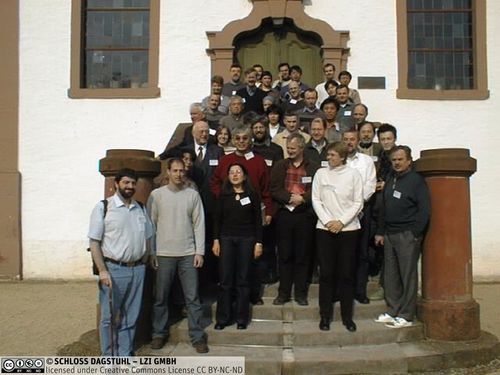Dagstuhl Seminar 02151
Theoretical Foundations of Computer Vision -- Geometry, Morphology, and Computational Imaging
( Apr 07 – Apr 12, 2002 )
Permalink
Organizers
- Tetsuo Asano (JAIST - Ishikawa, JP)
- Reinhard Klette (University of Auckland, NZ)
- Christian Ronse (University of Strasbourg, FR)
Contact
External Homepage
Impacts
- Geometry, morphology, and computational imaging : 11th international workshop on theoretical foundations of computer vision, Dagstuhl Castle, Germany, April 7 - 12, 2002, revised papers - Asano, Tetsuo ; Klette, Reinhard ; Ronse, Christian - Berlin : Springer, 2003. - X, 436 S - (Lecture notes in computer science ; 2616). ISBN: 3-540-00916-7.
- Linear time algorithm for approximating a curve by a single-peaked curve : article : S. 103-115 - Chun, Jinhee; Sadakane, Kunihiko; Tokuyama, Takeshi - Berlin : Springer, 2006 - (Algorithmica : 44. 2006, 2 : S. 103-112). DOI: 10.1007/s00453-005-1201-y.
Image analysis and computer graphics depends on geometric modelling and analysis of objects in two- or multidimensional spaces. Different disciplines such as digital geometry, mathematical morphology, polyeder geometry or computational geometry, just to cite a few, are closely related to progress in image analysis and computer graphics.
The seminar intention is to discuss theoretical fundamentals related to those issues and to specify open problems and major directions of further development in the field of geometric problems related to image analysis and computer graphics. The seminar schedule will be characterised by flexibility, working groups, and sufficient time for focused discussions. There will be an edited volume of seminar papers (within the Springer LNCS series) with a submission date following the workshop.
The co-chairs propose to consider contributions related to one of the following subjects:
- geometric algorithms for computer vision for extracting structures from images, geometric shape matching, image segmentation and image restoration,
- mathematical morphology (shape descriptors, connectivity models, topological algorithms, grey-level and colour image geometry),
- geometric feature analysis (length of a curve, area of surfaces in 3D, curvature: models, algorithms, performance analysis, multigrid convergence),
All seminar participants are expected to contribute either a short (20 min) or a long (40 min) talk during the seminar. Some contributions in neighbouring topics (digital topology, arithmetical geometry, stochastic geometry, geometric modelling) can also be accepted, however, the majority of talks should focus on the specified subject list.
Participants may contribute to a list of open problems for inclusion into the workshop report. Working groups may be formed on day one of the seminar for smaller and more focuses meetings during the week. There will be a session on Monday for discussing options for such working groups.
Reports of the previous Seminar on the Theoretical Foundations of Computer Vision are still available at Dagstuhl office or via the Dagstuhl webserver. The recent ones are:
- Akira Asano (Hiroshima University, JP)
- Tetsuo Asano (JAIST - Ishikawa, JP) [dblp]
- Patrick Baker (University of Maryland - College Park, US)
- John L. Barron (University of Western Ontario - London, CA)
- Isabelle Bloch (ENST - Paris, FR)
- David Coeurjolly (Université Lumière Lyon 2, FR)
- Alain Daurat (University of Strasbourg, FR)
- Isabelle Debled-Rennesson (CNRS - Nancy, FR)
- Koichiro Deguchi (Tohoku University - Sendai, JP)
- Helene Dörksen (Universität Hamburg, DE)
- Ulrich Eckhardt (Universität Hamburg, DE)
- Georgy L. Gimel'farb (University of Auckland, NZ)
- Yasushi Hirano (Nagoya University, JP)
- Tomio Hirata (Nagoya University, JP)
- Fay Huang (Academica Sinica - Taipei, TW)
- Atsushi Imiya (Chiba University, JP) [dblp]
- Naoki Katoh (Kyoto University, JP)
- Yukiko Kenmochi (Okayama University, JP)
- Nahum Kiryati (Tel Aviv University, IL)
- Reinhard Klette (University of Auckland, NZ) [dblp]
- Ullrich Köthe (Universität Hamburg, DE)
- Birgit Loch (The University of Queensland, AU)
- Mostefa Mohammed Mesmoudi (University of Genova, IT)
- David M. Mount (University of Maryland - College Park, US) [dblp]
- Jan Neumann (University of Maryland - College Park, US)
- Hartmut Prautzsch (KIT - Karlsruher Institut für Technologie, DE) [dblp]
- Jos B.T.M. Roerdink (University of Groningen, NL) [dblp]
- Christian Ronse (University of Strasbourg, FR)
- Isabelle Sivignon (University of Grenoble, FR)
- Fridrich Sloboda (Slovak Academy of Sciences - Bratislava, SK)
- Gerald Sommer (Universität Kiel, DE)
- Kokichi Sugihara (University of Tokyo, JP)
- Mohamed Tajine (University of Strasbourg, FR)
- Takeshi Tokuyama (Tohoku University - Sendai, JP) [dblp]
- Akihiko Torii (Chiba University, JP) [dblp]
- Peter Veelaert (Hogent - Ghent, BE)
- Remco Veltkamp (Utrecht University, NL) [dblp]
- Michael Werman (The Hebrew University of Jerusalem, IL)
- Guy Windreich (Tel Aviv University, IL)
- Bedrich Zatko (Slovak Academy of Sciences - Bratislava, SK)
Related Seminars
- Dagstuhl Seminar 9411: Theoretical Foundations of Computer Vision (1994-03-14 - 1994-03-18) (Details)
- Dagstuhl Seminar 9612: Theoretical Foundations of Computer Vision (1996-03-18 - 1996-03-22) (Details)
- Dagstuhl Seminar 98111: Evaluation and Validation of Computer Vision Algorithms (1998-03-16 - 1998-03-20) (Details)
- Dagstuhl Seminar 00111: Multi-Image Search, Filtering, Reasoning and Visualisation (2000-03-12 - 2000-03-17) (Details)
- Dagstuhl Seminar 04251: Imaging Beyond the Pin-hole Camera. 12th Seminar on Theoretical Foundations of Computer Vision (2004-06-13 - 2004-06-18) (Details)
- Dagstuhl Seminar 06241: Human Motion - Understanding, Modeling, Capture and Animation. 13th Workshop on Theoretical Foundations of Computer Vision (2006-06-11 - 2006-06-16) (Details)
- Dagstuhl Seminar 08291: Statistical and Geometrical Approaches to Visual Motion Analysis. 14th Workshop “Theoretic Foundations of Computer Vision” (2008-07-13 - 2008-07-18) (Details)
- Dagstuhl Seminar 11261: Outdoor and Large-Scale Real-World Scene Analysis. 15th Workshop "Theoretic Foundations of Computer Vision" (2011-06-26 - 2011-07-01) (Details)
- Dagstuhl Seminar 15081: Holistic Scene Understanding (2015-02-15 - 2015-02-20) (Details)


